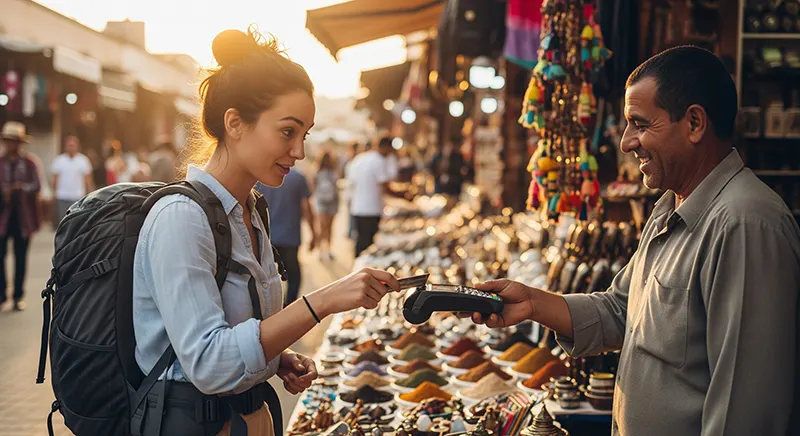Travelling abroad is an exciting adventure filled with new cultures, cuisines, and experiences. However, one aspect of international travel that can leave a dent in your budget is currency exchange fees. These hidden costs can quickly add up, leaving you with less money to enjoy your trip. But worry not! With some smart planning and practical currency exchange tips, you can avoid hefty fees and make the most of your travel funds.
Understanding Currency Exchanging Fees
Currency exchanging fees are charges applied when you convert one currency to another. These fees can vary depending on the method you use, such as exchanging cash at a bank, using an ATM abroad, or paying with your credit card in a foreign country.
You might come across several types of fees during currency exchange:
- Exchange Rate Markups: This is the difference between the market exchange rate and the rate offered by a provider.
- Service Fees: Flat fees charged for processing the transaction.
- ATM Fees: Charges for using foreign ATMs, which can include fees from both your bank and the local bank.
- Dynamic Currency Conversion (DCC): An option to pay in your home currency instead of the local currency, often at unfavorable exchange rates.
By understanding these fees, you can take proactive steps to minimise them. Let’s dive into some actionable currency exchange tips.
1. Plan Ahead and Research
Preparation is key when it comes to currency exchanging. Before your trip, research the current exchange rates for your destination’s currency. Use trusted websites like XE or OANDA to get real-time rates.
Here’s why this helps:
- Knowing the standard rates allows you to identify providers offering fair deals.
- It helps you decide the best time to convert your money if rates are fluctuating.
Moreover, check if your destination prefers cash or card payments. For instance, some countries are highly card-friendly, while others operate primarily on cash. Understanding the preference for abroad currency transactions can save you from unnecessary hassles.
2. Avoid Airport Currency Exchanging Counters
While airport currency exchanging counters are convenient, they’re notorious for poor exchange rates and high fees. These providers capitalise on travellers in need of quick currency, offering rates far below market value.
Instead, opt for:
- Local banks or ATMs at your destination.
- Online currency exchanging services before your trip.
3. Use Multi-Currency Travel Cards
A multi-currency travel card is a fantastic tool for travellers. These cards allow you to load money in multiple currencies at competitive exchange rates. Once loaded, you can use the card to make purchases or withdraw cash without incurring additional conversion fees.
Benefits of travel cards include:
- Locked-in exchange rates: Protects you from rate fluctuations.
- Lower or no ATM withdrawal fees.
- Widely accepted across the globe.
Research and compare travel cards offered by banks or financial institutions to find one that suits your needs.
4. Opt for Local Currency Payments
When paying by card abroad, you may be asked whether you want to pay in your home currency or the local currency. Always choose the local currency. Paying in your home currency often involves dynamic currency conversion, which comes with unfavorable exchange rates and additional fees.
5. Use ATMs Wisely
ATMs can be a cost-effective way to access cash abroad, but only if used strategically. Here’s how you can optimise their use:
- Withdraw larger amounts to minimise per-transaction fees.
- Use ATMs operated by reputable banks to avoid excessive surcharges.
- Check with your bank for partnerships with foreign banks to reduce fees.
Some banks also offer premium accounts with fee waivers for international ATM withdrawals. If you travel frequently, this could be worth exploring.
6. Compare Currency Exchange Providers
When you need to exchange cash, don’t settle for the first provider you find. Check and compare rates offered by various sources, including banks, currency exchange offices, and online platforms.
Pro tip: Online currency exchanging platforms often offer better rates and the convenience of doorstep delivery. Check their reviews and ensure they’re authorised before proceeding.
7. Avoid Excessive Cash Exchange
While it’s wise to have some cash on hand, carrying excessive amounts increases the risk of loss or theft. A combination of cash, cards, and digital payment options provides flexibility and security during your trip.
8. Monitor Exchange Rates During Your Trip
Currency exchanging rates can fluctuate daily. Keep an eye on the rates throughout your trip, especially if you’re planning to exchange a significant amount. Apps and websites can help you track real-time rates and make informed decisions.
9. Use Mobile Payment Apps
In many countries, mobile payment apps are gaining popularity. Platforms like Google Pay, Apple Pay, and local apps often provide favorable exchange rates and eliminate the need for carrying cash. Check if these apps are accepted in your destination country. These apps can simplify managing abroad currency transactions efficiently.
10. Purchase Travel Insurance
Travel insurance may not directly reduce currency exchange fees, but it can protect you from unexpected expenses like medical emergencies or trip cancellations. With travel insurance, you can allocate your travel funds more effectively without worrying about unforeseen costs.
One such reliable option is Niva Bupa Travel Insurance, which offers comprehensive coverage tailored to your travel needs. From medical emergencies to lost baggage, it’s a must-have for stress-free journeys.
Additional Tips to Enhance Savings
In addition to the above strategies, consider these extra tips to optimise your spending:
- Set Up Alerts for Exchange Rates: Some apps and banks offer notifications when rates hit your desired level. This can help you exchange currency at the most favorable times.
- Keep Small Denominations: When exchanging money, request smaller bills. This can be handy for tipping or small purchases and prevents the need for further currency breaking, which might incur fees.
- Use Local Bank Branches: If you’re travelling for an extended period, setting up a local bank account could save on frequent transaction fees. Many banks in popular destinations cater to expats and travellers.
Summing up
Avoiding high currency exchange fees while travelling abroad requires a combination of planning, research, and smart spending habits. By understanding the nuances of currency exchange and implementing the tips mentioned above, you can save money and enjoy your trip without financial worries. With these practical currency exchange tips, your adventure can be both budget-friendly and memorable.
Remember, protecting your finances is as crucial as enjoying the journey. A reliable travel insurance plan, such as Niva Bupa Travel Insurance, adds an extra layer of security, ensuring that you’re prepared for any unexpected events. So, pack your bags, plan wisely, and make the most of your journey! Bon voyage!











